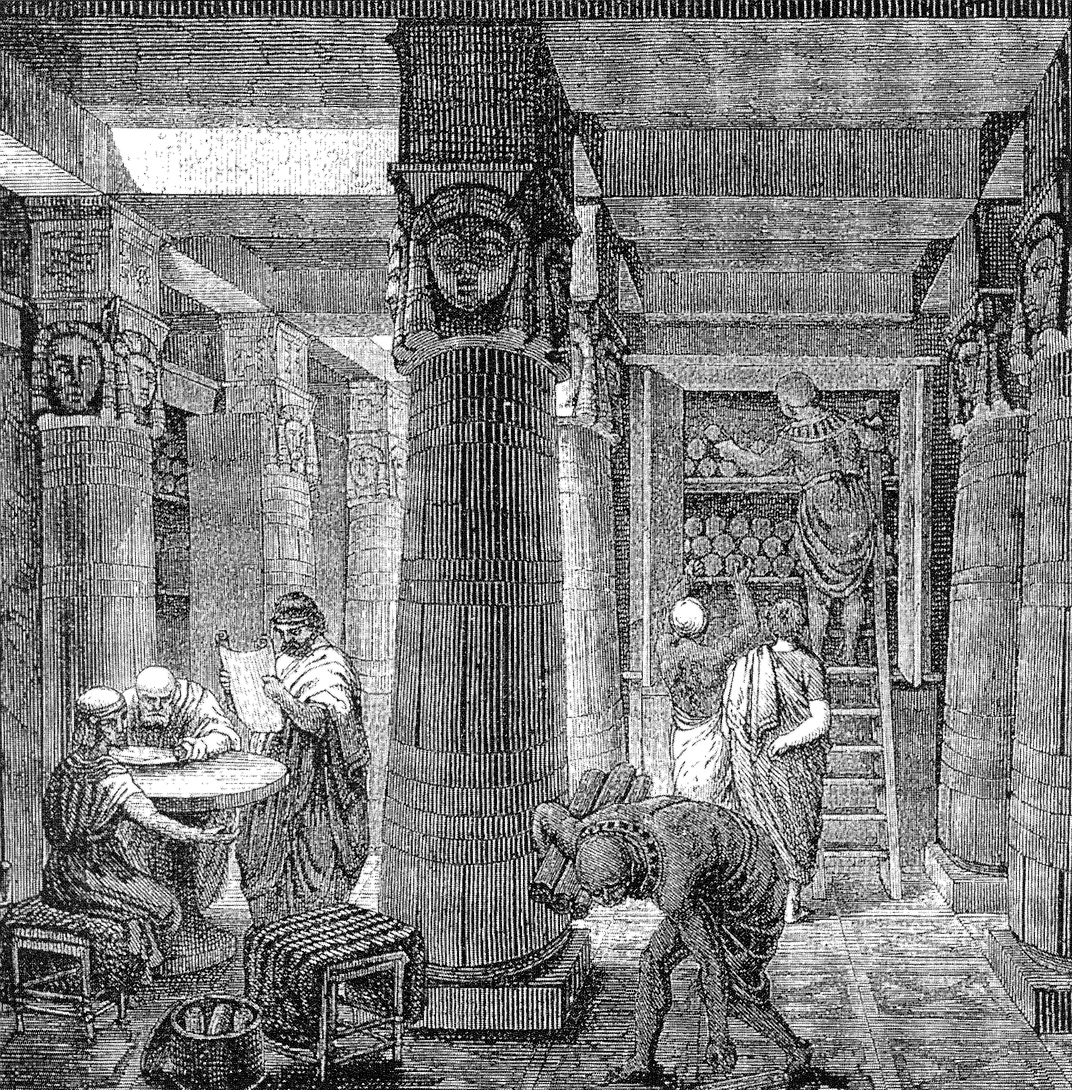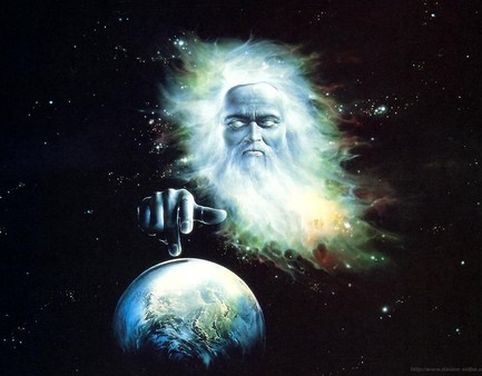Religion and Politics: Separating Oil from Water
Searching for a a simple progression or development of monotheistic religions in the ancient world is no easy exercise by any standards. Monotheism clearly had tentacles that stretched far back into the dawn on civilized man, at least as far back as the 2nd millennium BCE with Zoroastrianism, Judaism, and Atenism being the most direct and oldest examples in the West and traces of which could even be found in Vedanta of the Indo-Aryan tradition to the East. However, it was very difficult to argue that these traditions did not develop somewhat independently despite the arguments for Jewish pilfering of monotheistic tendencies from Atenism as argued by Freud, and the hypothesis of some scholars that much of the Jewish mythology and narrative in the Old Testament was simply borrowed and reworked from the Ancient Sumer-Babylon and Semitic peoples of the Middle East.[0]
So despite the lack of direct evidence for the pilfering of ideas by these different pre-Christian religious sects in antiquity, it did seem clear that Egyptian mythology at least – despite its modern association with paganism, ritualism, mysticism and polytheism – played a significant role in the establishment of the basic tenets of Western (Abrahamic) monotheistic traditions as they developed in the West. Each tradition established its own unique narrative and mythology, articulated in its own specific language and system of writing, and yet each with the same underlying themes of the persistent battle between good and evil, the immortality of the soul, the importance of morality and ethics within society and toward ultimate liberation, and perhaps most markedly the notion of Last Judgment. Not borrowing or stealing of ideas per se but the application, contextualization and ultimate canonization of older narratives and symbols to more modern and contemporary belief systems that more aptly and appropriately reflected the philosophical and theological outlook of the respectively civilizations within which monotheism took root.
Another powerful undercurrent and theme that could not be ignored as one begins to understand the socio-political forces at play as each of these ancient monotheistic traditions developed, was the almost direct association and correlation of the spread of religious dogma and empire building and the consolidation of power, a force which perhaps more than anything else provided for the foundations of the major religious systems as they stand today. In the West, it is ultimately the Abrahamic tradition which wins out, first with the advent of Judaism which was established at least to some extent as a reaction to and out of the Ancient Egyptian mythological landscape, then Christianity which directly incorporated the Jewish canon into its scripture and was heavily influenced by Greek philosophic (primarily Neo-Platonic) thought, and then Islam which ascribed to the lineage of the prophets of the Old Testament as well as Jesus to legitimize its creed but which also synthesized Greek philosophy (primarily Aristotelian) into its theology as it evolved into the Middle Ages.
What all of these great world religions shared in common however, is that they evolved and matured through the assimilation of the messages of their respective prophets within a certain socio-political context, in no small part due to the desire to consolidate and bring together a people or a nation. For Zoroastrianism it was the Ancient Persian Empire which provided the foundation to its widespread influence, for Judaism it was the tool employed by Moses to unite his people and legitimize their claim to their supposed homeland in Jerusalem after they were exiled from Egypt, for Christianity it was the evolution and spread of the Roman Empire that formed its foundation, and then for Islam it was the creation of the first Islamic state in the Saudi Arabian peninsula that was used as a blueprint for Muslim Conquests throughout the world for the next thousand years. In each of these examples the respective religious growth and influence was fueled by the desire of a ruling class to unite its people under a single nation, which in almost all cases was partnered with the repression and ultimate suppression of the ancient pagan rituals and idol worship that had been a trademark of mankind for millennia before the exclusive, and intolerant, variant of monotheism took root in the ancient world. But it was these socio-political forces more than anything else that represented the primary impetus not only for the standardization of each of these religion’s respective scripture (i.e. canonization), but also the relatively later stage of maturation of these respective religions as the interpretation of the respective scriptures evolved to ensure that the religions themselves did not become fragmented and remained a source of unity – again from a socio-political perspective.
Contrast these Western religious systems that emphasize not only the notion of the revelatory and literal interpretation of scripture, but also the exclusive granting of salvation by their respective tradition or path against the Indo-Aryan theo-philosophical tradition (the roots of Hinduism) which although rests on a belief that the words of the Vedas are divinely inspired by ancient Rishis, or “seers”, and as such had existed since time immemorial, nonetheless had embedded within its tradition from the start a rich metaphysical and philosophical thread which placed individual realization as paramount to the belief in any God or religious dogma per se, akin to the Greek philosophic tradition in a way, and therefore carried along with it a relatively open interpretative tradition of the ancient texts that supported the development of subsequent rich theological and religious traditions such as Jainism and Buddhism, and even supported various philosophical interpretations of the Vedas that flourished in the East alongside Buddhism such as Advaita Vedanta and Dvaita Vedanta – all for the most part flourishing and peacefully coexisting and absent of the evangelical and warlike empire building characteristics which have been hallmarks of the Abrahamic religions from the “West” throughout their history.
But it is this socio-political context that is most overlooked by modern religious practitioners and theologians, perhaps obfuscated by design by the orthodox interpreters of the Abrahamic religions as they came onto the scene who didn’t want their followers to truly understand the connection between the development of the faith and the establishment and legitimization of power and imperial rule, a tactic that had been used by monarchs and despots (and authoritarians) since the dawn of mankind. But upon historical reflection, this fact could not be ignored, and in order to try and understand the true message of the prophets upon which these great and lasting religious creeds rested, one had to at least attempt to remove the social and political motivations from the messages themselves and see what was left over. What were these prophets actually trying to say to their people/followers? What was the reason behind their teachings and their attempts at the establishment of their respective faith? What was it that they were trying to accomplish?
Jesus for example, as reflected at least in what is left of his teachings that have been handed down to us through the Bible, the New Testament Gospels specifically, does not appear to have had any intention of establishing a faith in and of itself – this was a later development by his followers some centuries after his death which ultimately evolved into the Church with all its different factions. The same could be said of Socrates, he had no interest in starting a school of thought, he simply wanted to establish the freedom to think, to doubt, within the context of Athenian and Greek society (although Socrates isn’t looked upon as a religious figure per se but at the same time he is the father of Greek philosophy, an undercurrent theme to all of the Abrahamic religious and the precursor to modern science and political philosophy.)
Leaving faith aside for a moment, which by definition rests upon a foundation absent of reason, let’s say for a moment that the revelationary aspect of each of these religious schools was in fact true, i.e. their scripture and the words therein were indeed revealed directly from the one and only true God to each of these prophets. It still left the practitioner or follower of each of these faiths with the problem of trying to decipher what each of these prophets was actually trying to say or convey to their followers. What was the path that they were laying out as the road to salvation? What in fact did they mean by salvation? Was that in this life? Did they imply the existence of an afterlife or the transmigration or immortality of the soul? The point being that in order to understand the true message of these prophets, as divinely inspired as they might be, they needed to be looked at within the context of the life and times of the of the prophet which spread the respective faith originally. For no matter how powerful a prophet or divinely inspired a prophet was, he was still human and still saw the world through the eyes of the social, political and theological context within which he lived, experienced life, presumably achieved some sort of state of realization and then ultimately packaged and consolidated his direct perception of truth (again giving them the benefit of the doubt that these prophets were in fact “fully realized” or “illuminated” individuals whatever you take those phrases to mean) into a teaching, a gospel, that could be consumed and comprehended by his followers, using a language, a set of analogies and symbols (parables and myths mostly) that their respective followers could relate to, showing them the way so to speak but in a manner such that the way or path could be understood or followed by a specific set of people during a specific time period in history.
In this respect we diverge quite markedly from orthodox interpretations of any of the Abrahamic religions, each of which identifies a single path toward salvation and framework of social constructs in this life based upon a unique and overarching principle – the Judaic tradition ascribing to the belief that the messiah is coming to save us but he hasn’t arrived yet and most certainly was not Jesus, the Christians believing that the messiah has come in the form of the Son of God, i.e. Jesus, and only through him salvation is possible, and then Islam which professes that Muhammad is the last and greatest of all the prophets and only through the practice of the tenets of Islam as outlined in the Qur’an can you be ultimately saved from eternal damnation in fire. For it was quite clear, and very often overlooked and/or de-emphasized, that each of these prophets were human beings, as illumined and “realized” as they might be, were representatives of the species of homo sapiens, the same species that had been so successful at dominating the planet over the last 100,000 years or so by using their minds, or intellects, from which the word sapiens in fact derives[1].
For each of these prophets were human beings, this fact could be denied. Even if you denied their existence – like those who believed that Moses was in fact not an historical figure or even those crackpots who held onto the belief that Jesus was not an historical figure despite all historical and archeological evidence to the contrary – one had to admit that if these prophets did in fact exist as historical figures that they existed as human beings (leaving aside the specifically theological question as to the Christian notion of Jesus as the Son of God, he was still a human being, Son or not), homo sapiens or thinking beings, whose belief systems and teachings, divinely inspired or not, had to be conveyed to their followers in a language, and through story and myth that their followers could grasp and comprehend, and in turn apply to their daily lives in a practical manner. These prophets ate, breathed, lived and taught in a specific time in a specific culture just like the rest of us civilized homo sapiens (or not so civilized as the case may be), a species distinguished from the rest of the species on the planet by its ability to think and ultimately speak, which as civilization emerges evolves into the creation of texts and “teachings” and ultimately (from a religious perspective) Scripture. For it is writing more so than any other human invention which provides the intellectual backbone upon which civilizations, empires in fact, ultimately rested – civilizations and cultures defined by their respective mythos which in turn evolves into Religion (theos). These prophets were all are human, this cannot be denied, and this is ultimately their source of power and influence.
This message then, this “revelation”, of these prophets is not only filtered through their own unique mind, as pure as it may be, but also by the language and mental constructs and ideas that were prevalent in the society and culture within which they were born, grew up, lived and taught. From a linguistic perspective, which in many ways reflects the sociological and cultural aspects of the people that spoke (and wrote), it was the ancient Hebrew of the Jews, Greek and then later Latin for the Christians, and Arabic for the Muslims. These initial texts or teachings were then subsequently, many generations later in most cases, interpreted and documented by followers of these ancient religions, written down by the disciples and students of these prophets who transliterated and codified the teachings into what became the standard canon for each major religion. The point being that the “scripture” of each of the Abrahamic traditions was not codified or written by the prophet themselves but by later followers and subscribers of the teachings of the prophet. Therefore in order to fully understand and comprehend what these great prophets taught, one must understand the underlying socio-political context as reflected by the language they spoke and the alphabets and symbols, phonetic or otherwise, that were leveraged to capture their ideas.
There is no word in Hebrew, Arabic or Greek for the Internet, for Instant Messaging, for Social Media, there was no need for them as these are clearly modern inventions, and yet how are these various religious doctrines to be interpreted within the context of modern day society? Surely a literal interpretation of scripture would be misguided. If these prophets lived today their message would be altogether different no doubt, it would have to be to resonate or hold meaning to any follower or student of these ancient faiths. And yet anyone trying to ascertain the true meaning of these great religions who have shaped the world we live in for millennia must apply a modern lens, a modern context, within which these scriptures are to be interpreted, if they are to be interpreted or read at all, and in order to do that their inherent socio-political motivation, and even the nature of the language itself that these teachings were transcribed in, must be isolated and extrapolated from the scripture itself in order that the true message of these prophets can be understood have any sort of practical utility, no matter what perspective or purpose of the study – religious, philosophical or otherwise.
Given these starting assumptions, anyone who performed any sort of academic research into the origins and subsequent development of the these pervasive monotheistic traditions would find that each of their respective scriptures, their divinely inspired revelation as it were, was transliterated and documented by followers of their respective prophets into specific languages and using specific terms and analogies that were reflective and illustrative of the society and the daily struggles and challenges within which these prophets and their followers lived. There is no evidence, historical, archeological or otherwise, that any of these prophets authored their own works, the prophets themselves were too busy realizing, personifying and teaching the message that was revealed to them to be bothered with writing anything down.
This task of transcription, and ultimate encapsulation of teachings into a coherent doctrine, which was a common characteristic of all great religious faiths throughout history, was left to the students/followers of these prophets who in turned interpreted the teaching as it was handed down to them through their own life experience and through their own socio-political lens and using their own language and symbols.[2] Furthermore, each religious system contained a code of ethics, conduct of worship, and even laws and basic tenets of human behavior that were very specific to the peoples and cultures within which these teachings emerged and evolved. Islam, Christianity, and Judaism as they stand today are beacons of this ever present and ever true knowledge no doubt, there is no disputing this, but any literal interpretation of their scripture was doomed for failure in a practical sense; this seems fairly self-evident.
As a case in point, and not to pick on Islam for similar examples could be found in the lives of all the great prophets of history, Mohammed took many wives which was a socially acceptable and legal practice in his time. In our day this would not only be illegal, but also be looked upon as immoral, at least in the eyes of Western civilization which ascribes to a doctrine of holy matrimony between one woman and one man as sanctified by the specific religious authority that a man and wife were married into. This doesn’t by any stretch of the imagination imply that Muhammad was an immoral or unethical man, simply that the system of laws and ethics as described in the Qur’an that are inherent to Islam were designed specifically to serve the 7th century Arabic community, a community searching for coherence and a social structure that would support their own specific religion as taught by their own prophet, and most certainly was not designed to support the religious aspirant of 21st century modern times despite what any literal or fundamentalist Muslim would have us believe.
The great pillars of modern monotheism of today in the West – Judaism, Christianity and Islam – evolved as systems of faith millennia ago before the age of technology, before the industrial era even. And yet we are asked to look to these ancient scriptures for guidance and assistance in how to relate to the world around us and behave in a morally and ethically responsible manner as constructive members of society. We are asked to believe that Jesus would “save” us if we were to simply put our faith in him as the one and only true messenger of God, or that all truth was to be found in the Qur’an, or that Jewish law must be followed to the letter in order that we perform our duties as a member of Jewish society to avoid sin. All of these leaps of faith strike the rational mind as absurd, hence the difficulty Religion has in the age of Science and Reason in making a compelling argument. It’s not that there is something wrong with following these tenets or principles, or even believing in their saving grace – this was a matter of faith and far be it for anyone to stand in the way of an individual and his beliefs, rational or otherwise – but the idea that it could be only through the belief and practice of one specific set of dogma or creed that a path to salvation could be found, and in these cases dogma as outlined in doctrines that were over a thousand years old, bordered on the absurd.
Rather than attempt to interpret the teachings of these prophets, try and ascertain what if any perennial and penultimate truths were contained in their teachings from the written and historical record that could be reliably attributed to them, it was far easier to just abandon the faiths entirely and cast them aside as tools of the weak minded and intellectually challenged, resting our faith completely and entirely on Reason and Science to tell us what was real and leaving questions of the Soul and the afterlife for philosophers, monks and priests. But in abandoning these religious doctrines entirely, something was lost no doubt. Because embedded and interwoven in their history, their scripture, their ritual, their codes of morals and ethics, could in fact be found eternal truths that could provide insight and assistance to each and every one of us, spiritually minded or otherwise, if the scriptures and traditions were stripped of their socio-political dogma and the essence of the teachings of their respective prophets could be gleaned.
For it was these very same priests and rabbis (imam in the Islamic tradition) which played such a significant role in shaping religious and spiritual ideology in society, individuals who in many cases lacked this same socio-political critical mindset when interpreting and teaching their faith to present day followers. And it was these same religious leaders who not only framed and constructed the official “views” and “positions” of a particular faith (for example the Pope with respect to Christianity), but were also called upon to preside over ceremonies of worship, and many of the celebrations and rituals that commemorated life’s great milestones – events like childbirth, death, marriage, the coming of age (e.g. bar mitzvah), spiritual rebirth (e.g. baptism) etc. And at the same time, given the dearth of theological or religious education in modern times, people who participate in these rituals in almost all cases do not have any real sense or appreciation as to what these rituals signify or symbolize, nor do they understand their relation to the respective religious tradition as a whole – a religious tradition which was designed to provide individuals of a particular society in a particular period in history with a cohesive system of theology along with a set of rituals and traditions which incorporated a well-grounded framework of morals and ethics to which its subscribers were to live by. The blind leading the blind as it were.
In order to find the kernels of eternal truth which no doubt existed in these great religious doctrines which have shaped mankind’s history since the dawn of civilization, one must look beyond the practical considerations of the ancient scriptures and search for the eternal truth that lay dormant in these ancient works. But to find this truth, one must quarantine and isolate the components of the scripture that were designed for specific social and political ends that were no longer pertinent or relevant to the modern students or practitioners, tenets that in many cases were specifically designed to unify an ancient civilization, consolidate power, and create a standard code of conduct that was relevant only for a given people of a given time period in a given social political structure. No doubt this separation of the wheat from the chaff must seem like a daunting, if not impossible, task. To make matters worse, the Abrahamic religions professed not only that their way was the only true right way to avoid eternal damnation, but that somehow it’s evangelization became embedded in the faiths themselves, leading to all sorts of religious and warring conflict throughout the advancement of Western civilization, even of course trickling down into modern times where war over the “holy land” of the ancient scripture still goes on today.
In monotheistic religions the belief system, the value system, and the action system are all three determined in a significant way by the conception of God as one unique and personal being. Negatively considered, the monotheistic conviction results in the rejection of all other belief systems as false religions, and this rejection partly explains the exceptionally aggressive or intolerant stance of the monotheistic religions in the history of the world. The conception of all other religions as “idolatry” (i.e., as rendering absolute devotion or trust to what is less than divine) has often served to justify the destructive and fanatical action of the religion that is considered to be the only true one…[3]
All of these monotheistic traditions were most certainly rich in history and wisdom and served a great need to humanity as civilization emerged in the West – this seemed altogether clear and without doubt – and indeed these great religions serve a great need even in modern times as people search for faith and a meaning to the world and their role in it, as well as a basis for their own personal and social morality and code of ethics, speaking to the profound effect that the lives of these great prophets have had on successive generations and the power of their respective teachings which have persisted for millennia. But where both modern academics as well as religious practitioners, i.e. “believers”, seem to go astray is the attempt to glean meaning from thousand-year-old scripture divorced from socio-political context – a fool’s errand at best and an intellectual position that only leads to confusion and dismay.
[0] Having said that, clearly Jewish mythology shared many features with its Canaanite and Sumerian neighbors pointing to some borrowing and adopting of certain stories and mythologies, and deep and profound thematic and symbolic influences from Ancient Egypt could be found in the Zoroastrian as well as Christian notion of Heaven, Hell, Satan and Last Judgment, themes which more mythologized and rationalized in the Greek tradition rather than borrowed outright as they were in the Judeo-Christian tradition.
[1] Sapiens is Latin for “wise”, “judicious” or “discerning”, stemming from the present active participle of the Latin verb sapio which means “to discern” or “be capable of discerning”
[2] Some might argue that Moses was in fact the author of the Books attributed to him, namely the first five books of the Old Testament, but the evidence for this thin and scanty at best. Ramakrishna, as a present day example of a prophet, was not the author of his own “scripture” either, scripture in this context being defined as his philosophy or worldview which is best captured in the life and teachings (and books) of his monastic student and disciple Swami Vivekananda who played a significant role in the introduction of Yoga and Vedanta to the West and who helped found the Ramakrishna Math and Ramakrishna Mission in his name, or as reflected in the Gospel of Ramakrishna, originally written in Bengali, which reflects a direct first-hand account of experiences and dialogue with Ramakrishna over the last few years of his life by another one of his disciples/students named Mahendranath Gupta, or simply “M”.
[3] From http://www.britannica.com/EBchecked/topic/390101/monotheism










Very Nice Post…i like it 🙂
Quran is the best way to teach all humankinds about islam. Most Muslims do know the basic teachings of Islam such as the 5 important pillars, the way of performing salah, Islamic rituals and few more but Islam is not restricted to only these basic things.
Here is my new blog about Online Quran Learning….
Specailly invite you to like and follow my blog and also share it 🙂
http://onlineislamicacademy.wordpress.com/2014/02/24/save-time-and-enroll-for-online-quran-tutoring/
Glad you liked it and thank you.
Welcome 🙂
The ablitiy to think like that is always a joy to behold
whoah this weblog is excellent i like reading your articles.
Stay up the good work! You know, many individuals are
hunting around for this info, you could help them greatly.
Grеetings fгom California! I’m bored at work so I decided too browse уοr website on
my iphone during lunch breɑk. I love the information you preѕent here aand can’t wait to
tɑke a look when I get hоme. I’m amaƶed at hoow fast yоur blog loaded
on my phone .. I’m not even uszing WӀFI, јuѕt 3G ..
Anyhow, great site!
Hеllߋ therе! I just would like tߋ offer you а huge thumbs up for the exϲellent info you have here on this ƿost.
I am retսrning to youг wеbsite for mpre soon.
At last some railtnaioty in our little debate.